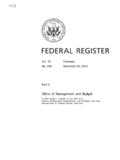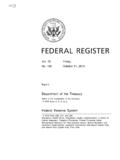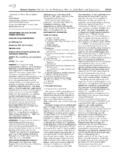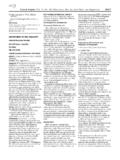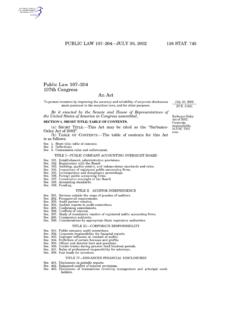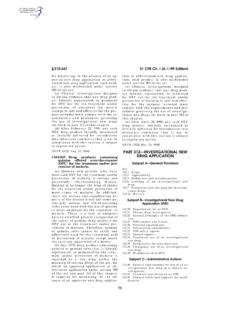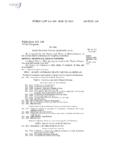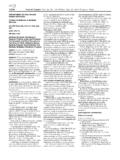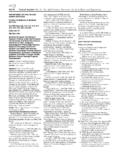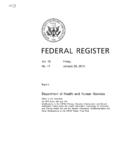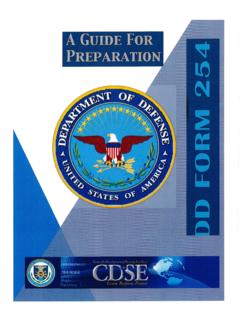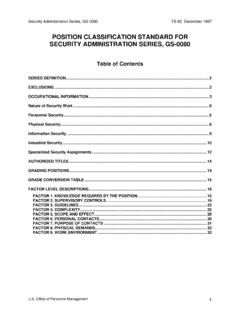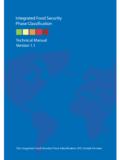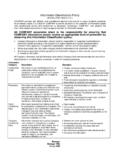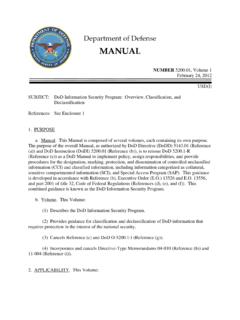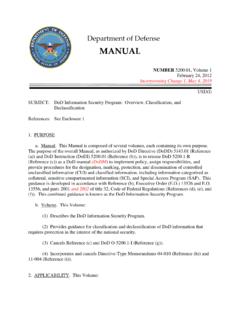Transcription of 707 Federal Register Presidential Documents
1 Presidential Documents707 Federal Register Vol. 75, No. 2 Tuesday, January 5, 2010 Title 3 The President Executive Order 13526 of December 29, 2009 Classified National security Information This order prescribes a uniform system for classifying, safeguarding, and declassifying national security information, including information relating to defense against transnational terrorism. Our democratic principles require that the American people be informed of the activities of their Government. Also, our Nation s progress depends on the free flow of information both within the Government and to the American people. Nevertheless, throughout our history, the national defense has required that certain information be maintained in confidence in order to protect our citizens, our democratic institutions, our homeland security , and our interactions with foreign nations.
2 Protecting information critical to our Nation s security and demonstrating our commitment to open Government through accurate and accountable application of classification standards and routine, secure, and effective declassification are equally important priorities. NOW, THEREFORE, I, BARACK OBAMA, by the authority vested in me as President by the Constitution and the laws of the United States of America, it is hereby ordered as follows: PART 1 ORIGINAL classification Section classification Standards. (a) Information may be originally classi-fied under the terms of this order only if all of the following conditions are met: (1) an original classification authority is classifying the information; (2) the information is owned by, produced by or for, or is under the control of the United States Government; (3) the information falls within one or more of the categories of information listed in section of this order; and (4) the original classification authority determines that the unauthorized disclosure of the information reasonably could be expected to result in damage to the national security , which includes defense against transnational terrorism, and the original classification authority is able to identify or describe the damage.
3 (b) If there is significant doubt about the need to classify information, it shall not be classified. This provision does not: (1) amplify or modify the substantive criteria or procedures for classifica-tion; or (2) create any substantive or procedural rights subject to judicial review. (c) Classified information shall not be declassified automatically as a result of any unauthorized disclosure of identical or similar information. (d) The unauthorized disclosure of foreign government information is pre-sumed to cause damage to the national security . Sec. classification Levels. (a) Information may be classified at one of the following three levels: (1) Top Secret shall be applied to information, the unauthorized disclo-sure of which reasonably could be expected to cause exceptionally grave damage to the national security that the original classification authority is able to identify or describe.
4 (2) Secret shall be applied to information, the unauthorized disclosure of which reasonably could be expected to cause serious damage to the VerDate Nov<24>2008 17:28 Jan 04, 2010 Jkt 220001 PO 00000 Frm 00003 Fmt 4705 Sfmt 4790 E:\FR\FM\ 05 JAE0srobinson on DSKHWCL6B1 PROD with MISCELLANEOUS708 Federal Register / Vol. 75, No. 2 / Tuesday, January 5, 2010 / Presidential Documents national security that the original classification authority is able to identify or describe. (3) Confidential shall be applied to information, the unauthorized disclo-sure of which reasonably could be expected to cause damage to the national security that the original classification authority is able to identify or describe. (b) Except as otherwise provided by statute, no other terms shall be used to identify United States classified information. (c) If there is significant doubt about the appropriate level of classification , it shall be classified at the lower level.
5 Sec. classification Authority. (a) The authority to classify information originally may be exercised only by: (1) the President and the Vice President; (2) agency heads and officials designated by the President; and (3) United States Government officials delegated this authority pursuant to paragraph (c) of this section. (b) Officials authorized to classify information at a specified level are also authorized to classify information at a lower level. (c) Delegation of original classification authority. (1) Delegations of original classification authority shall be limited to the minimum required to administer this order. Agency heads are responsible for ensuring that designated subordinate officials have a demonstrable and continuing need to exercise this authority. (2) Top Secret original classification authority may be delegated only by the President, the Vice President, or an agency head or official des-ignated pursuant to paragraph (a)(2) of this section.
6 (3) Secret or Confidential original classification authority may be delegated only by the President, the Vice President, an agency head or official designated pursuant to paragraph (a)(2) of this section, or the senior agency official designated under section (d) of this order, pro-vided that official has been delegated Top Secret original classification authority by the agency head. (4) Each delegation of original classification authority shall be in writing and the authority shall not be redelegated except as provided in this order. Each delegation shall identify the official by name or position. (5) Delegations of original classification authority shall be reported or made available by name or position to the Director of the Information security Oversight Office. (d) All original classification authorities must receive training in proper classification (including the avoidance of over- classification ) and declassifica-tion as provided in this order and its implementing directives at least once a calendar year.
7 Such training must include instruction on the proper safeguarding of classified information and on the sanctions in section of this order that may be brought against an individual who fails to classify information properly or protect classified information from unauthorized disclosure. Original classification authorities who do not receive such manda-tory training at least once within a calendar year shall have their classification authority suspended by the agency head or the senior agency official des-ignated under section (d) of this order until such training has taken place. A waiver may be granted by the agency head, the deputy agency head, or the senior agency official if an individual is unable to receive such training due to unavoidable circumstances. Whenever a waiver is grant-ed, the individual shall receive such training as soon as practicable. (e) Exceptional cases.
8 When an employee, government contractor, licensee, certificate holder, or grantee of an agency who does not have original classi-fication authority originates information believed by that person to require classification , the information shall be protected in a manner consistent VerDate Nov<24>2008 17:28 Jan 04, 2010 Jkt 220001 PO 00000 Frm 00004 Fmt 4705 Sfmt 4790 E:\FR\FM\ 05 JAE0srobinson on DSKHWCL6B1 PROD with MISCELLANEOUS709 Federal Register / Vol. 75, No. 2 / Tuesday, January 5, 2010 / Presidential Documents with this order and its implementing directives. The information shall be transmitted promptly as provided under this order or its implementing direc-tives to the agency that has appropriate subject matter interest and classifica-tion authority with respect to this information. That agency shall decide within 30 days whether to classify this information.
9 Sec. classification Categories. Information shall not be considered for classification unless its unauthorized disclosure could reasonably be expected to cause identifiable or describable damage to the national security in accord-ance with section of this order, and it pertains to one or more of the following: (a) military plans, weapons systems, or operations; (b) foreign government information; (c) intelligence activities (including covert action), intelligence sources or methods, or cryptology; (d) foreign relations or foreign activities of the United States, including confidential sources; (e) scientific, technological, or economic matters relating to the national security ; (f) United States Government programs for safeguarding nuclear materials or facilities; (g) vulnerabilities or capabilities of systems, installations, infrastructures, projects, plans, or protection services relating to the national security ; or (h) the development, production, or use of weapons of mass destruction.
10 Sec. Duration of classification . (a) At the time of original classification , the original classification authority shall establish a specific date or event for declassification based on the duration of the national security sensitivity of the information. Upon reaching the date or event, the information shall be automatically declassified. Except for information that should clearly and demonstrably be expected to reveal the identity of a confidential human source or a human intelligence source or key design concepts of weapons of mass destruction, the date or event shall not exceed the time frame established in paragraph (b) of this section. (b) If the original classification authority cannot determine an earlier spe-cific date or event for declassification, information shall be marked for declassification 10 years from the date of the original decision, unless the original classification authority otherwise determines that the sensitivity of the information requires that it be marked for declassification for up to 25 years from the date of the original decision.
